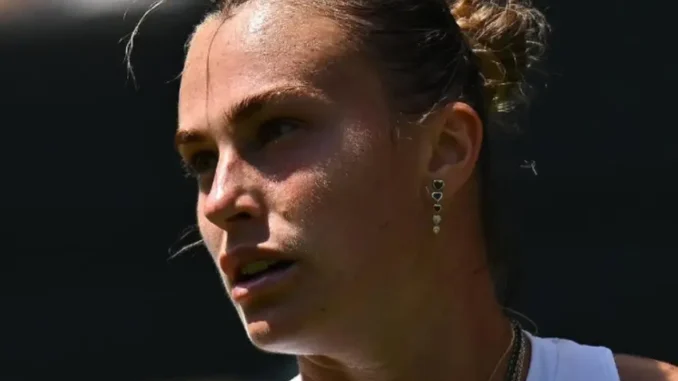
The 2025 Wimbledon Championships have been a crucible of surprises, with top seeds falling and emotions running high. Amid this turmoil, world No. 1 Aryna Sabalenka has emerged not only as a formidable force on the court but also as a beacon of empathy off it. Following a stunning first-round exit by Alexander Zverev, the No. 3 seed, against France’s Arthur Rinderknech on July 1, Sabalenka offered poignant advice to the German star, who laid bare his mental health struggles in a raw post-match press conference. Her words, drawn from her own journey, underscore the importance of openness in navigating the relentless pressures of professional tennis.
Zverev’s defeat, a grueling five-set battle ending 7-6(3), 6-7(8), 6-3, 6-7(5), 6-4, marked his first opening-round Grand Slam loss since 2019. The 28-year-old, a three-time Grand Slam finalist, appeared visibly shaken, admitting to feelings of profound isolation. “I’ve never felt this empty before. Just lacking joy in everything that I do. It’s not necessarily about tennis. Just lacking joy outside of tennis, as well,” he confessed. Zverev, who has faced off-court challenges, including allegations of domestic abuse, hinted at seeking professional help for the first time. “Maybe for the first time in my life I’ll probably need it,” he said, acknowledging the weight of personal and media-related difficulties since his Australian Open final loss earlier in 2025.
Sabalenka, speaking after her own hard-fought second-round victory over Marie Bouzkova on July 2, responded with compassion and wisdom. The 27-year-old Belarusian, a three-time Grand Slam champion, shared her own experience with mental health challenges, having worked with a therapist for five years until 2022. “It’s actually crazy to hear from someone like Alexander because he surrounded himself with the family, you know?” she remarked, noting Zverev’s close-knit support system. Drawing from her journey, she urged him to confide in those closest to him. “It’s really important to talk openly about whatever you’re dealing with. Especially if you have your family, talk about what you are experiencing because if you’re going to keep it inside, it’s just going to destroy you.”
Sabalenka’s advice was rooted in her own transformation. After years of therapy, she found solace in open conversations with her team, whom she credits for her current mental resilience. “We always talk a lot … we can talk about whatever,” she explained. “I know they’re not going to judge me and not blame me. They’re going to accept it, and we’re just going to work through it. This is the best advice I can give Sascha.” Her approach has helped her navigate the pressures of being the world’s top-ranked player, with a 2025 season boasting three titles in Brisbane, Miami, and Madrid, and a 42-8 record. Her straight-sets win over Bouzkova, despite a challenging first set, exemplified the “explosive control” she’s honed both on and off the court.
Zverev’s candid admission sent ripples through the tennis community, amplifying concerns about the mental toll of the sport. His brother, Mischa, expressed surprise at the depth of Alexander’s struggles, noting that losses like the Australian Open final to Jannik Sinner had fueled an “emotional whirlwind.” The German’s openness sparked support from peers, with Sabalenka’s response standing out for its empathy. “The moment you start talk about your problems, you kind of start realising a lot of things. It’s helping to solve them,” she said, emphasizing that vulnerability is a strength. She believes Zverev’s family, who have been a constant presence, could be his greatest asset in overcoming feelings of loneliness and emptiness.
The broader context of Wimbledon 2025, with its record-tying 23 seeded players exiting by Day 2, underscores the sport’s relentless demands. Players like Daria Kasatkina and Alexei Popyrin also spoke of the mental strain, with Kasatkina admitting to pre-match stress and Popyrin feeling “numb” after a shock loss. Sabalenka’s call for openness resonates in this environment, where the pressure to perform on tennis’s grandest stage can exacerbate personal struggles. As she prepares for a blockbuster third-round clash with Emma Raducanu, Sabalenka’s leadership—both as a player and a voice for mental health—shines. For Zverev, her advice offers a lifeline: “He just needs to open up to whoever is close to him. Like, I think family is the best, people who can accept whatever you’re dealing with.” As he contemplates his next steps, perhaps at the upcoming EFG Swiss Open, Zverev’s path forward may hinge on heeding Sabalenka’s heartfelt counsel.
Leave a Reply